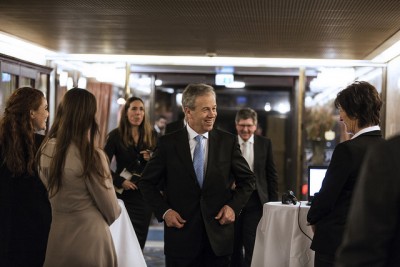Øystein Olsen, governor of Norway’s central bank, could finally relax a bit over the weekend after delivering the annual address that’s among the most closely followed in the country. The affable central banker also has had to deal with a string of new economic challenges lately, but says he still sleeps well at night.

For the second year in a row, Olsen used his annual address to argue for a new rule regarding how Norway spends or saves its oil revenues. With top government officials in the first row and Norway’s most powerful business leaders elsewhere in the audience, Olsen also urged that the government should stop tapping into the oil fund that’s meant to fund pensions for future generations.
“My main message was that now it would be sensible to call a halt, and not increase the use of oil money beyond today’s level,” Olsen summed up for newspaper Dagens Næringsliv (DN) during the weekend. “I’m satisfied with the response.”

His speech was generally well-received and illustrated Norwegian prudence. The interest then shifted to the powerful if modest man himself, and how he offsets the demands of such things as monitoring the economy, setting interest rates and shaking hands all evening with the other most powerful people in one of the wealthiest countries in the world.
He said he intended to spend time over the weekend with his family, with wife Ellen who’s a nurse, his two grown children and three grandchildren. The 63-year-old Olsen, who sometimes limps because of a polio infection as an infant, nonetheless hoped to go skiing and said he most appreciated a Saturday night dinner of stroganoff with red wine, followed by the “world’s best cheese cake,” made by his wife. “That may sound like a very 1970s-style meny, but it’s so good!” Olsen exclaimed.

Olsen has been an economist all his adult life, after graduating from the University of Oslo and doing research at the University of California at Berkeley. He’s been a professor, at the Norwegian Business School (BI), a top bureaucrat in the finance ministry and head of the state statistics bureau SSB before being appointed governor of the central bank (Norges Bank) in 2011.
He’s been at the forefront lately in guiding Norway through a new period of economic turbulence caused by a dive in oil prices. He and his fellow bank board members decided to trim interest rates late last year, a surprise move that sent the krone into a dive a well. The economic boom that Norway enjoyed for nearly a decade suddenly seemed to fizzle immediately, and it’s part of Olsen’s job to help keep the country humming.
Like other top business and government leaders, Olsen insists Norway is not facing any economic crisis. Norwegians need to adapt, though, to less-robust times. He finds strength and solace himself in winter sports, in his local football club Stabæk (“always, regardless,” to quote the club’s motto, which he uses to end his annual address) and in his family. He still misses his brother Knut Olsen, a well-known journalist for Norwegian Broadcasting (NRK) who died of cancer just 10 days after he took over as central banker.
“You never get over a loss like that,” Øystein Olsen told newspaper Aftenposten recently. “Nor should we, but at the same time life goes on. We have talked about that a lot, with family and friends.” Olsen said his brother took on a self-appointed role of media adviser as Olsen rose to prominent public positions, sending him ratings of his interviews and telling him to just “be yourself, and show your commitment.”
Informal style
Today Øystein Olsen is far removed from the stiff image of a central banker, opting for an open, smiling style based on being professional but accessible. “I have always seen it as natural to go down to the canteen and eat lunch (with everyone else) around 11:30am,” Olsen told Aftenposten. “It’s much nicer to sit and chat with colleagues than to sit alone in the office.”
Since he’s the equivalent of a Federal Reserve Bank boss in one of the world’s most affluent counties, Olsen gets attention abroad. “We attract considerable interest over how we have managed our oil wealth,” he said. He’s the boss for the oil fund’s boss, and is keen on making sure the fund keeps growing.
Meanwhile, he hadn’t missed another victory by chess champion Magnus Carlsen last week and was looking forward to watching cross-country skiing queen Marit Bjørgen in the upcoming world championships. “We can never get enough gold on the ski trails,” he exclaims. When Monday rolled around, though, it was back to work, telling DN that now he and his staff will start preparing the next monetary policy report to be published on March 19.
newsinenglish.no/Nina Berglund

